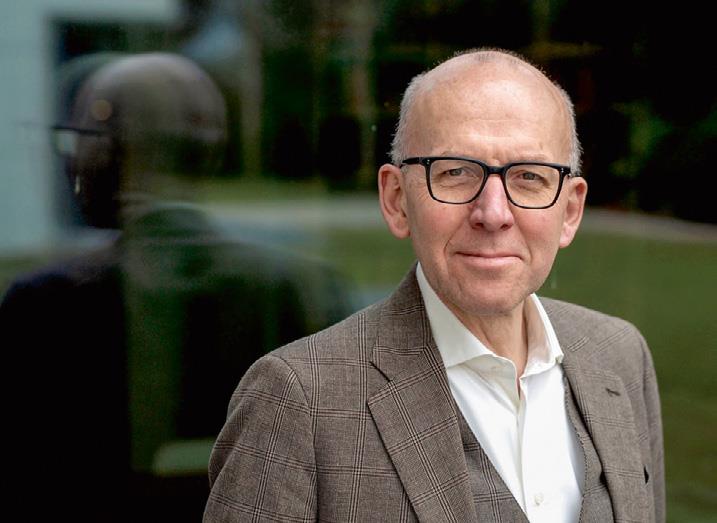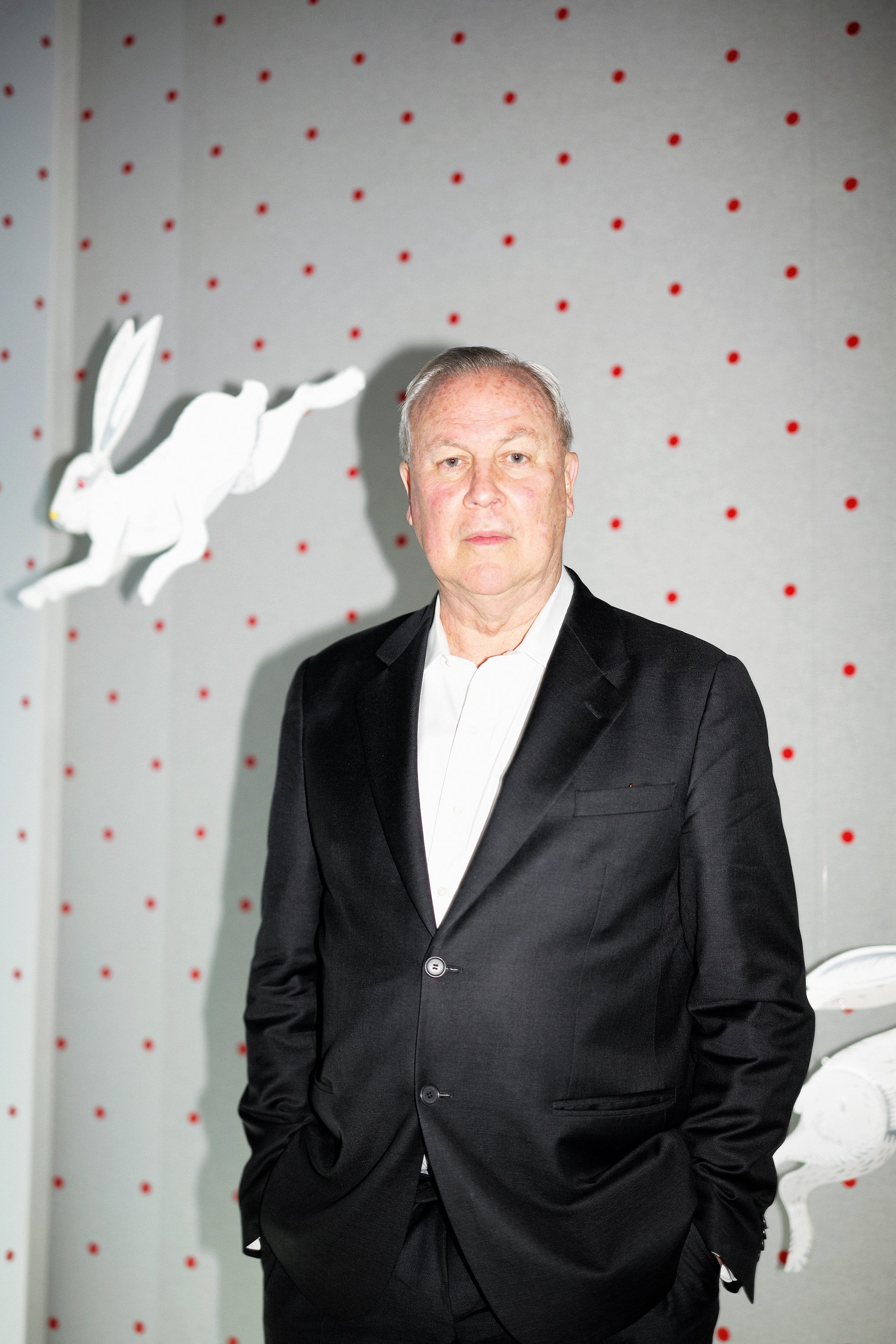WHO’S THAT GIRL? ANGELA MERKEL and the German Psyche
|JOACHIM BESSING

From austerity enforcer to refugee haven, Germany is a European powerhouse sending out mixed messages. No one embodies this mystery more than German Chancellor Angela Merkel, the most powerful woman in the world. Sociologist HEINZ BUDE gives 032c a primer on understanding Angela Merkel and the German psyche.

Heinz Bude and I meet at the cafeteria of the Berliner Ensemble, the theater once established by Helene Weigel and Berthold Brecht. Its cafeteria is a place of comfort and buzz, where old ladies sit at long tables dressed all in red and white.
A sign stands on the table, it says: Technik. Outside its front door sits director Leander Haussmann dictating ideas. Heinz Bude finds this place to be “pleasant.” The sociologist holds a chair in macro-sociology at the Universität Kassel, but is best known for his countless book releases and tireless contributions to all established German media outlets. In a field dominated by pie charts and demographics, Bude’s research on social exclusion and generational cohesion focuses on affect as opposed to numbers. The power of moods was the subject of Bude’s most recent book. He can explain what is up with Germans and – macro-sociologically speaking – Germany in this time.
JOACHIM BESSING: My favorite chapter of your latest publication Das Gefühl der Welt – Über die Macht der Stimmung [“The Feeling of the World – On the Power of Moods”] was the one on the mood of the sexes in today’s society. What has changed in German society in the years of Angela Merkel’s reign?
HEINZ BUDE: In order to explain that, I’d like for us to take another look at the beginning of the Merkel era. For me, the quiet revolution in Germany actually began in 1999 and 2000. It was Gerhard Schröder’s time. Schröder does something crazy. Helmut Kohl preceded him as Germany’s chancellor of 16 years. Kohl was a real German republican. What unifies these German republicans is their understanding of the nation’s collective suffering from the consequences of World War II. This feeling means: We are one. Despite all differences – some have more than others, but World War II and its consequences – we suffer and have to take responsibility collectively. For Kohl, this included the holocaust.
There was that picture of him and François Mitterrand holding hands.
Genocide plus war were amalgamated into a narrative of suffering that contained an obligation to reconstruction – not only in the material sense, but also in the moral sense. This logic provided a quiet resource for the building of loyalty in West German society – and partially the GDR, too – until reunification. For Kohl, even the reunification was carried by this idea: “Us West Germans have to help out our brothers and sisters in the East.” He thought they were just out of luck. In his mind, they had suffered the same war and then were locked away behind a wall in the wrong part of Germany. This thought stems from contingency. It does not exist in generations born after 1960. I see this in your work too. From 1960 on, everything is filtered through irony.
Inevitably!
This generation grew up in Tatort ambiance.
More like Derrick ambiance.
Derrick is one of the most successful Germans.
The actor Horst Tappert who played Derrick had these enormous bags under his eyes. In an interview shortly before his death he said, “They hold all the tears I never cried.”
Herbert Reinecke, who wrote the scripts for Derrick, was a World War II soldier like Kohl’s predecessor, Helmut Schmidt. They created a highly specific timbre in German society: a post-war mentality. A mentality of restoration. And then Gerhard Schröder arrives, who completely turns this mood on its head. He says, “The source does not lie behind us anymore, it lies ahead of us.” What he means is an increase of competitive capacity. Schröder warned of the stagnation this Derrick mood constituted and wanted to push open windows. Helmut Kohl already sensed this need for change and issued a warning in his final policy statement that Germany was turning into a “collective amusement park.” Something had not been right for a while now, and Gerhard Schröder finally stated what that was. Interestingly enough, it was an invitation towards marginalized groups that were not on the Federal Republic’s radar. First came East Germans – Schröder told them, “Join in!” Then those with a migrant background – Schröder said, “Join in!” And then women.
However, under Gerhard Schröder and Joschka Fischer, the privileges of women were cut back in terms of child custody, alimonies, and pension adjustment after divorce. The short era of Fischer-Schröder was an era of male virility, too.
Yes.
“Merkel does have some incredibly charming facial expressions. I once spent an evening with her. She is very funny.” – Heinz Bude
In one scene of Macbeth, Lady Macbeth appeals, “Unsex me.” Free me of my gender, so I can survive this battle. Guzzling and kicking the can down the road, Helmut Kohl transformed into the nation’s genderless drone. Angela Merkel showed some similarities from the beginning. Kohl called her “my girl.” But she never tried to foreground her womanhood in any way.
Although Merkel does have some incredibly charming facial expressions. I once spent an evening with her. She is very funny. And she is simply not power-crazed like Schröder was. She is able to say, “I don’t know how much longer I’ll be doing this.” She alludes to the idea that she has different plans for her life – like reading books, for example. I buy it. It is her feminine side. There is this Gerhard Schröder sentence that comes from Christoph Schlingensief. Schröder says, “I can’t do this anymore.” This exhaustion is visible, too, in current pictures of Barack Obama. He has aged immensely. You get the sense that men are not allowed to give up until they have to. This pressure does not apply to Angela Merkel. And its lack lets her appear chosen rather than driven. If there is such a thing, femininity’s defining attribute is keeping existential options open.
That absolutely was the end of it. If you take a look at their concepts of masculinity, Fischer and Schröder appear lost. They try to play it up. And, by the way, Joschka Fischer is a romantic, too. In love with love, but in a way, he is clumsy. His emotional metabolism needs more regulation. He probably doesn’t make enough time for his eroticism. Yes, that surely is common in his field of work. But Angela Merkel just has an enchanting smile. I find it very youthful.
That’s “my girl!”
She’s “the girl!”
Helmut Kohl said this to diminish her. But today, at the height of the refugee crisis – or in 2008, during the financial crisis – one worries about her health. Her exhaustion and the strain of her office are visible on screen. But Angela Merkel’s display of tiredness is second to none.
She is just great. Everyone can learn from her. But in terms of the Federal Republic, and its increased competitiveness, Angela Merkel represents a departure from Kohl. A departure from incredible sentimentality – Kohl cried in public a lot. You can’t even imagine her doing that. At the state ceremony following Helmut Schmidt’s death, Angela Merkel said some nice things about him in her speech, and then, “Well, those were big words, but he was quite difficult at times, wasn’t he?” This is interesting, too, because clearly her era is coming to an end. We are already bidding our farewells.
“Her exhaustion and the strain of her office are visible on screen. Angela Merkel’s display of tiredness is second to none.” – Joachim Bessing
And she will be missed dearly. At the moment, I can’t imagine a time after Merkel.
It’s true! Historically, this is an interesting situation. Angela Merkel is often referred to as Mutti [“mommy”], but I strongly disagree with this nickname. And those who use it don’t get her at all. She never said things would be easy – not in discussions about the Euro, and not in those about refugees. In her best times, she interacted with an emancipated audience. People were well-informed. The mood has shifted, and I find the amount of people who constantly feel rubbed the wrong way to be problematic. They perceive everything as fraudulent.
They scream “Lügenpresse!”
But it doesn’t stop there. This perception of things as fraudulent can be applied to theater as well. People say that nothing but director’s theater is staged in Germany anymore. This claim, of course, proves to be untrue if you actually go to the theater. Or people get all riled up about tax havens in Panama, and who allegedly hides their money there. It’s a strange mood. I’m talking about bannerless anti-capitalists versus laid-back fatalists with no faith in “the system.”
And you claim that those who decide on one of these two stances miss out on half of the perception of the world.
Currently, our society blocks out one half. But I see a tendency towards a mood that goes beyond these two positions. I sense a longing for “repair,” as Hugo von Hofmannsthal called it.
Or, a forbidden word: A longing for Heil.
Absolutely, that too. I believe that politics, art, and social science will miss the point as long as they don’t realize this. We have to see this and face this desire. You rightly say, “A strange idea like Heil.” Is this not naïve? Am I not making a fool of myself? This is what makes our current situation so interesting. I recently was part of a discussion on television and almost started a fight with Richard David Precht. He took on this fashionable radical attitude of blaming capitalism for everything. I felt like an old man calling him to order.
I think this belief stems from his bitterness considering the inefficacy of his cultural productions. By nature, that lets one drift to the Right. Botho Strauss is a prime example.
Bitterness is a very important point. I know the according surveys. In my opinion, even the people who have no reason to be bitter, are bitter.
I think this is caused by a perceived inefficacy. For presently living human beings, it often feels as though their work is being fed into a black hole. Nothing returns from it. A tweet earns 120 hearts, but minutes later gets flushed down the timeline. Even if you write a book, you learn that your publisher will take it off the market after three months if it doesn’t sell enough copies in this short time span it has been given to prove itself, tops! Never mind “publish or perish.” Nothing beats success.
I’d especially like to analyze the astounding success of Giulia Ender’s mega-bestseller Darm mit Charme [“Bowels with Charm”] through my fractured logic: Repair often times incorporates our bodies. Our bodies constantly gain importance. Not only in a sense of fleeing reality, but in a sense of settling in reality.
This would explain the rise of yoga.
That too. But fine arts also illustrate this movement. Cynical post-modernism is very out of fashion. It’s art for oligarchs – although I used to appreciate Jeff Koons very much. But what good is it now? I feel encouraged by Achille Mbembe’s Critique de la Raison Nègre (“Critique of Black Reason”). He shares my view and says, “Those colonized have every right to counter-violence – but it is no help.” I see a reverse trend towards regionalism in Germany. The stand-up comedy scene is a very obvious manifestation of regionality. Place has more relevance than class. This is a profound feeling. Soccer is extremely popular and exclusively about regionality. I know two very successful lawyers in Berlin, both of whom are die- hard fans of Borussia Dortmund. They both moved to Berlin from the Ruhr area and their passion for this club is related to a sense of home. It’s strange.
“Angela Merkel’s slogan ‘Wir schaffen das’ [‘We can do this’], mainly expresses helplessness.” – Heinz Bude
So much for feelings. Now let’s talk hard facts. One million refugees appear to be far too many for a lot of Germans.
Angela Merkel’s slogan “Wir schaffen das” [“We can do this”], mainly expresses helplessness. Barack Obama’s “Yes we can” would not work in the United States today. This phrase would seem hollow to the people. Bernie Sanders’s slogan, “A future to believe in,” is interesting in this light. It is also the point of our questions regarding Germany dealing with refugees: It’s not about establishing a cap, but about reasonable predictability. I recently spoke to Bavaria’s interior minister. He’s reasonable. He said: “The number of refugees Bavaria is taking in is around the number of inhabitants of Würzburg – it’s manageable. Not easy, but manageable. If I’m being honest, we can accommodate twice as many. It would be a bit harder, but still manageable. But three times the population of Würzburg – we can’t do that.” For the first time, Germany has to acknowledge that immigration is not just a question of open jobs. “As long as people find work, everything else will fall into place” – until last year, this was Germany’s mantra. And it was true, too. Now we realize that we have neglected urban development. We have to prevent the formation of suburbs akin to France’s Banlieues.
There, libraries would burn like in said Banlieues, because libraries are the only representatives of the state in Banlieues.
It’s getting to the point where Germans are considering destruction-oriented laws. Two colleagues of mine, who have been studying French suburbs for 30 years, refused to call the Banlieues “ghettos” for the longest time. Now, they say they are ghettos. Only two currencies remain there: violence and sex.
So men have become obsolete. Clemens J. Setz describes them as “sad secret agents whose employing state does not exist anymore.” Women can do anything, and then here come outside forces, which men think of as highly potent Arabs who will finish them off. But at the same time, Angela Merkel, our Lady Macbeth, is on her way out. How will this be perceived?
I like this sentence from Jean-Luc Godard’s Le Mépris a lot, “I hate you because you’re incapable of moving me.” That’s what this is all about. How can we capture the relationship between male-identifying and female-identifying humans? The energy at its core has to be that of moving someone. This movability – to move someone and be moved in return, to admit that someone moves you and that you depend on them – will mean the end of neoliberalism. Those who still believe that only the brave can rescue themselves are complete morons. Admitting one’s dependence does not equate softness. An ability to admit dependencies among adults signifies the friendly realism that we should aim for in the future.
Why has no politician ever admitted to being unable to continue their work due to heartbreak? Like Schröder’s “I can’t do this anymore,” but because of another person, instead of taxing politics within the faction.
Passion is in a crisis in Germany. A willingness to be dependent on something or someone requires a tolerance for tension. But tension can only be built towards a position that actually exists. Passion remains a category of the private, not one that exists publicly. In the mood for repair, this sentiment resurfaces: Nothing will be gained unless you put your life on the line. But, well, for what? If you don’t know the answer, you should ask others, “What do you think about this?” Because that no longer is a conversation about human rights and civilization. It’s a conversation about God.
“War is too easy. It is a response that avoids all these problems.” – Heinz Bude
Repair, passion, dependence, tension, an existential dimension – it seems the core of this conversation is circled by these terms. What do we find at its center?
Definitely not war. Not for me. War is too easy. It is a response that avoids all these problems.
But it’s a classic.
Of course. I don’t have a problem thinking about war, either. Sometimes you have to make war. But war does not grasp desire. I don’t feel drawn to war. I know many people who do. I find it interesting that everyone around Peter Sloterdijk feels this draw. Hegel, one of Germany’s greatest philosophers, dealt with these problems, too, and came to the conclusion: Love is the answer.
Of all things, love seems to have simultaneously become the easiest and the hardest.
Which has to do with the fundamental change in the tension between genders. Women are the big winners of educational expansion. Since 1999, German universities have more female than male students. This says it all. And now this interesting problem comes up: Women have equal rights, but not equality.
In The Philosophy of Andy Warhol, Warhol writes, “All strong women are looking for weak men to dominate them.”
This complicates things, but makes them even more interesting. We have reached the end of the Schröder and Fischer era. The end of the “Under My Thumb” era, but sometimes Brioni is okay. And of course you have to get up when a woman enters the room. For the future to be a success, we have to find answers to the questions that this new gender relation poses. One of the most successful television series on the theme is Girls. The show’s characters are women who inspect their own imperfections. Men only play an imaginary role in it.
“Of all things, love seems to have simultaneously become the easiest and the hardest.” – Joachim Bessing
The figure of the so-called Mr. Right.
And I don’t think this works.
Why does it not work?
Silicon Valley tends to think in the same direction. They imagine a cloud in which you can upload anything. But this Californian imagination is one without an outside. It wants to do away with any kind of outside. My idea of love has an inside and an outside. I insist on the outside.
What’s on the outside of love?
That to which I can give myself. I can only devote myself to a real person outside myself.
Imagine you fall in love with a person you’ve never met or touched – who you cannot see or touch – and still you fall in love with them based on what is constituted through your intellectual exchange. You can deduce from the beauty of this person’s thoughts that they are a beautiful person.
True. Yet I remain an orthodox Freudian. There is a difference between love and being in love. The overestimation of a partner’s sex by those who are in love can cause an overestimation of their intellect. This is what makes love happen. And, at love’s heart, there is a third notion: that of death. What is interesting about the way Silicon Valley thinks, is that the great thinker employed by it most is Charles Darwin. Darwin formulates an insane thought. His description of the world is one in which death has a function. Life, preservation of the species, death, evolution. This way of thinking is seductive. It constructs a pull much like war does. For me, these are pre-oedipal ideas: a world with no outside, where minds converse with minds. These are endless conversations. Hans-Ulrich Obrist endlessly engages in endless conversations. Always writing, never sleeping. Always in conversation. I think the core of love, the core of war, and the core of politics is the knowledge of our mortality. That life is finite.
Angela Merkel seems far removed from depression and disaster. She appears to be a healthy person, not fractured. Even in her most stressful moments, I can tell that in a minute she can go home and sleep for three hours.
This is calming, and what’s so soothing about her.
Why soothing?
Because it is somewhat inhuman. Take another look at the video of the speech in which she announces, “We can do this.” You will find a rare expression on her face.
Because she has to lie.
Because she has to make a claim not knowing what it is she is claiming. And because she knows her viewers know that she has to make this claim not knowing what it is she is claiming. The emancipated audience that many of us Germans are part of is asked to do something outrageous. We are asked to help Angela Merkel out. To say: “Well, she said we can do this, but maybe she was too optimistic. Maybe it just came out like that and now she’s lost track. But if we don’t help her now, if we leave Angela Merkel hanging, we won’t make it.” This is exactly the situation I currently find so irritating within the CDU/CSU: The only party member taking Angela Merkel seriously is Horst Seehofer. Everyone else is just waiting to see her fall. I find it monstrous. Ask any member of parliament who they think should succeed her. It’s a taboo subject. They all go pale.
Credits
- Interview: JOACHIM BESSING
- Image: HERLINDE KOELBL



